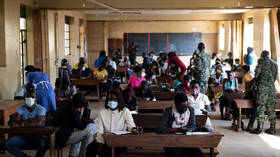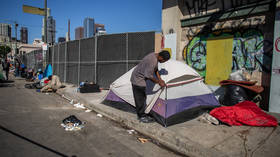Covid kills poor as rich get richer – report

Oxfam, a charity confederation, has said that while the wealth of the world’s top 10 richest people has doubled during the pandemic, the poor around the globe continue to suffer due to a dearth of vaccines and treatment.
In a report published on Monday, Oxfam claimed that a 99% windfall tax on the pandemic gains of the world’s 10 richest men would raise enough money to pay for vaccines for everyone on the planet.
“A 99% one-off windfall tax on the Covid-19 wealth gains of the 10 richest men alone would generate $812bn,” the report states, noting these 10 men have six times more money than the poorest 3.1 billion people.
The report, titled ‘Inequality kills’, claims that the rich have profited from structural and systemic policy choices which are skewed in their favor. Meanwhile, the poor have been directedly harmed by these decisions.
“Millions of people would still be alive today if they had had a vaccine – but they are dead, denied a chance while big pharmaceutical corporations continue to hold monopoly control of these technologies,” Oxfam said.
The charity claims that billionaires have thrived through the pandemic and that fiscal and monetary stimulus measures have contributed to their wealth as the stock market boomed.
“Vaccines were meant to end this pandemic, yet rich governments allowed pharma billionaires and monopolies to cut off the supply to billions of people. The result is that every kind of inequality imaginable risks rising. The predictability of it is sickening. The consequences of it kill,” Oxfam International Executive Director Gabriela Bucher said in the report.
Oxfam adds that the proportion of those who die from Covid-19 in developing countries is roughly double that in wealthy nations.
The report was released ahead of this week’s virtual World Economic Forum meetings, traditionally held in Davos, where leaders will discuss global challenges.
Pandemic reversing improvements in wealth inequality, World Bank says

World Bank President David Malpass explained that the situation arose from a confluence of negative factors, leading to a perfect storm of economic depression. “The world economy is simultaneously facing Covid-19, inflation, and policy uncertainty, with government spending and monetary policies in uncharted territory,” he said.
Noting that “booming asset prices” are bolstering the bank accounts of the rich even as job losses and massive inflation have torpedoed any growth within the poorest population groups, the Bank warned that such an “increasing divergence of fortunes” was “especially troubling given the possibility of social discontent in developing countries.” Spikes in some commodity prices – such as the fuel hike in Kazakhstan – can trigger popular outrage on such a level that it threatens governments’ control.Government-mandated shutdowns were the primary reason for a spike in poverty rates that has affected populations around the world, the report stated. Government spending, deficits, and debt have soared to “record highs” compared to GDP, and countries are reluctant to raise interest rates lest their populations prove to be unable to withstand the economic shock.
Worse, the effects of the Covid-19 shutdowns are likely to echo through multiple generations, as children’s educational development has suffered due to school closures – especially those in low-income families who particularly struggled to access remote learning, the Bank’s report warns.
Malpass insisted that mass vaccination and “concerted international action and a comprehensive set of national policy responses” were the only ways for his institution to correct the problems it helped cause. Chief among his recommendations was a call for accelerated debt relief efforts, and while he stressed the importance of carbon taxes and other climate-change policies, he acknowledged that now was perhaps not the time to raise fuel prices.
Both the Bank and the International Monetary Fund were strong proponents of lockdowns. Echoing a similar offer from the IMF, the World Bank reportedly told Belarus in early 2020 that it could receive a significant amount of relief funding in exchange for modeling its Covid-19 control measures on those of Italy, which at the time was under a strict lockdown. When President Alexander Lukashenko declined to lock down his country, the bank warned Minsk’s economy would “face a severe shock” that year – a carrot/stick approach often seen in that institution's dealings.
No comments:
Post a Comment